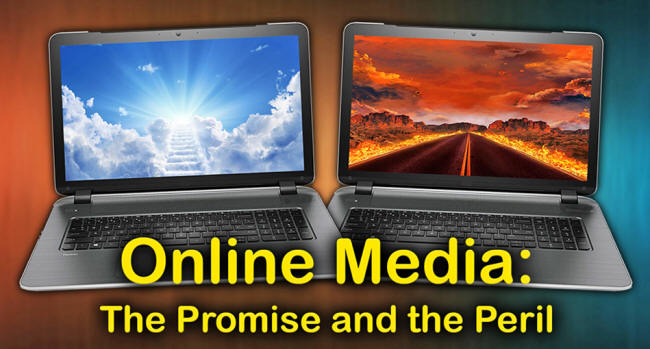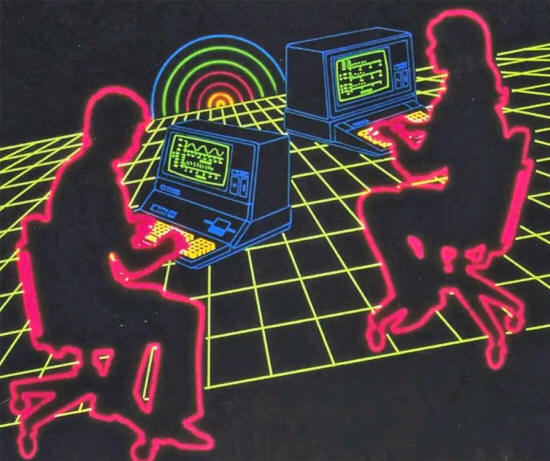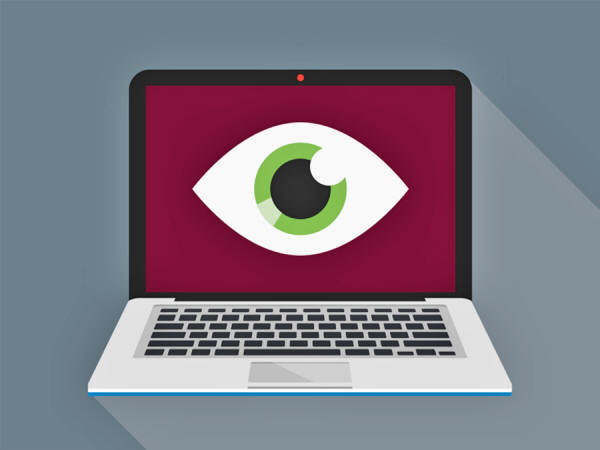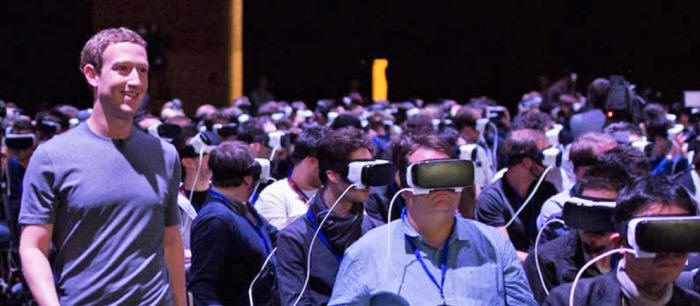|
You don't have to go out on a limb to suggest that the "online revolution" that has taken place in the 21st century is at least as dramatic (if not more so) than the Gutenberg printing press revolution itself.
But those of us who have been pondering the nature of this online revolution might be premature in making any final pronouncements on its ultimate significance.
As it turns out, the real revolution might still be in the works... and this revolution threatens to alter society so drastically that it could transform humanity itself.
If you've got your eyes peeled for such things, you'll have already noticed the PR propaganda roll-out pimping this coming transformation. Case in point:
In case you hadn't heard, as of next week, Facebook will no longer be known as Facebook.
At least, that's what The Verge is reporting, telling us that,
So,
Let's start our exploration by looking at the history of the online revolution so far and how it has already altered the course of our civilization.
The Promise
If you are of a certain age, you will recall the very early days of the online revolution.
Back in the 1990s, the legacy media broadcasters covered the dawning of the World Wide Web in much the same way the dinosaurs might have covered the approach of the species-ending meteor.
They struggled to decipher how to pronounce the "@" mark, they cooed about an "information superhighway" the details of which they could not have explained if they tried (which they didn't), and they participated in cringeworthy promotional videos for the new technology that are now the stuff of internet memes.
The hype surrounding the nascent medium was inescapable.
It also struck you as being unbelievably overblown the moment you were subjected to the reality of the early web experience. I'll never forget my mom's reaction to surfing the web for the first time.
After going to the homepage of The Hudson's Bay Company and finding only the lacklustre, non-responsive, non-interactive Web 1.0 placeholder website that was available at the time, she turned to me in surprise:
I told her she had to use her imagination.
She'd probably be able to buy things from it one day.
Indeed, the early hype about the web exists in that strange, paradoxical space reserved for truly revolutionary moments.
From one perspective, all of that early coverage of the "information explosion" was misplaced:
Like the futurists of the distant past who saw the invention of the zeppelin and envisioned fleets of blimps ferrying people over the Atlantic, the internet frenzy of the 1990s seems ridiculous to us today even though it wasn't that far off the mark.
In a sense, all of the predictions about the web were correct:
To take one example, think about the relationship between the old media dinosaurs and their audience. In the previous, offline paradigm, audience feedback was featured sparingly if at all.
Newspapers and magazines would publish "Letters to the Editor," but they were relegated to the back pages of the A section where few bothered to look.
TV and radio, meanwhile, may have occasionally run "call in and win" type audience participation games, but the idea of people being able to leave feedback on each individual news story broadcast on the nightly news in a publicly visible way was inconceivable.
The dawn of the web did indeed change all of that. Suddenly you could leave feedback directly on the websites of the major news organizations.
As time progressed and the public became bolder in calling out the blatant propaganda of the dinosaur media, the comments section of the website was where the real story was taking place.
It was not unusual to see,
It wasn't hard for the commenters who had been calling out the MSM liars to interpret this platitude:
(Yahoo! News of all outlets was a notable long-time hold-out to this trend, but they too succumbed last year, replacing their comments section with some self-contradictory boilerplate text about "creating a safe and engaging space for users to connect" and "improving our community experience" by "temporarily suspending comments.")
In a way, this comment crackdown speaks to the power of the online media revolution, a fulfillment - however partial and fleeting - of that initial promise that the "information superhighway" would lead to a "democratization of information" and give a voice to the average Joe.
It did indeed give a voice to the average Joe.
But, exactly as I pointed out earlier this year when my YouTube channel was deleted for wrong-think, the people who originally championed this online revolution (like former Time editor Richard Stengel, who championed "You" as the Person of the Year in 2006) are the very same people who are now fretting about "online disinformation" and wondering how best to re-impose centralized control over the media.
Yes, the fact that you are reading these words at all right now is itself a sign that one ordinary person sitting in their living room in the middle of nowhere can make a difference and - as the messages in my inbox every single day affirm that,
But they are now cracking down on outlets like this one and it's more evident than ever that the past two-and-a-half decades of (relative) freedom of speech online has lured people into the web so that they will become trapped there.
And, now that we're here, this free speech platform is being converted into a censorship, control and surveillance platform.
The Peril
In "From Internet to Information Superhighway" - an essay from the 1995 collection, Resisting the Virtual Life: The Culture and Politics of Information - Howard Besser shreds the platitudes and pieties of those once-ubiquitous "information superhighway" puff pieces.
As evidence of this process, Besser cites the hype that preceded the advent of cable television.
It's hard to remember now, but cable TV was originally hailed as an opportunity for an expansion of public access channels and educational programming. As we all know, however, it wasn't long before it devolved into dozens of channels of Ow! My Balls! brought to you by Brawndo (The Thirst Mutilator!).
The same process of commodification that homogenized and dumbed down information in the cable TV space would inevitably play out in the virtual space, Besser sagely predicted.
Fast forward two and a half decades and the amazing promise of the World Wide Web (capital letters and all) has itself devolved into the pitiful reality of a handful of boring, corporate-controlled websites:
The internet of 2021 evokes Henry Ford's infamous quip about the Model T:
Beyond the stultifying corporate homogenization of the modern web, however, lies a darker agenda: the digitalization and commodification of all our information.
As Besser correctly foresaw in his prescient 1995 essay:
This is the very essence of the surveillance capitalism that was the inevitable fruit of the tree of Surveillance Valley.
Even worse, steeped in a world of smartphones and social media, we have gradually put more and more of our lives online until now the very ability to live our lives offline (and thus out of the gaze of Big Brother, which we have known for years is recording and databasing our every data transaction) is under threat.
This, as I have been at pains to stress throughout the generated crisis of the scamdemic, is the point of the so-called "vaccine passports."
These systems of control will not be limited to vaccination records, but will become the lock on our digital gulag.
On the media front, it should be obvious by now that a world of Big Tech behemoths like Alphabet and Facebook (or whatever Zuckerberg ends up calling his DARPA-inspired surveillance operation),
...is a world even worse than that which existed under the old dinosaur media paradigm.
That observation applies to the FAANGSter mediopoly of the 21st century, of course, but it's become even worse.
Now that more and more information is being sent down the Orwellian memory hole (sometimes quite literally!), it is becoming possible to implement the central tenet of Ingsoc:
This is especially worrying, because I have some bad news for you: as bad as things are today, if they continue on the present course, they're about to get a whole lot worse.
The Future
In his seminal book, Understanding Media - written at the dawn of the television era but so insightful in its analysis that it is even more relevant to us today than it was to its original readers in 1964 - the criminally underrated philosopher Marshall McLuhan followed the logic of the evolving electronic media revolution to its inevitable conclusion:
The question of whether this "technological simulation of consciousness" is in fact a,
Indeed...
Back in 1964, all that talk about,
...must have sounded absolutely outlandish.
Today it is a chilling vision of the future that is right at our doorstep.
Did you see The Matrix? Yeah, it's basically the matrix...
More technically,
Oh, goodie...
Although it sounds like a nightmare to me, the idea of a VR cyber world is exactly the type of thing that makes all of the "reporters" on the dinosaur media's tech beat wet their pants with excitement.
Just do a quick news search for the word "metaverse." You will find no end of articles breathlessly laying out this vision of a future technology that doesn't actually exist yet...
But it will! And it will change everything!
Take this article from our friends at The Wall Street Journal as a representative example.
After a cliché-ridden opening sentence that would make even a high school student cringe in embarrassment ("Since the dawn of civilization, humans have had only one world in which to live: the real one"), it introduces us to the possibilities of this virtual universe with all of the subtlety and understatement of a sweaty-palmed 14 year old boy unwrapping a new video game console:
We are then treated to a litany of quotations from corporate executives who have a vested interest in the development of this technology and who (totally coincidentally!) also happen to think this is the best thing since sliced bread.
Hold your horses, guys:
It even highlights Nvidia executive Richard Kerris' assertion that, in the metaverse,
Seriously,
More ominously, though, the article quotes Zucker-borg himself informing us that the metaverse is the way of the future:
This is important not because Zuckerberg is some sort of guru foreseeing the future in his magical crystal ball, but because he is clearly a super-gopher that is being used by the powers-that-shouldn't-be to forward their agenda.
As such, he has the resources to throw at this vision until it becomes reality.
On that very point, we are told that Facebook will be hiring 10,000 workers in Europe specifically to start constructing this metaverse.
But this agenda isn't about creating a nifty new gimmick to get people online.
It is about the introduction of a truly new medium, one that incorporates all of our senses simultaneously and begins to literalize McLuhan's vision of electronic media,
To anyone who has read this series of articles, you will know the incredible importance of this development.
As each new mass media technology has ultimately served to further limit our access to information and manipulate our consciousness, the development of this Matrix-like "metaverse" could have profound (and profoundly terrifying) ramifications for human society.
Excellent questions!
These are among the questions that I will be attempting to answer in my course on The History of Mass Media, which will chart the development of the mass media from the late 19th century to the present and beyond.
Won't you join me...?
|






